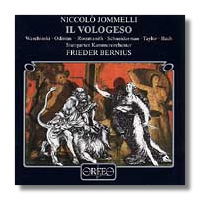
The Internet's Premier Classical Music Source
Related Links
- Latest Reviews
- More Reviews
-
By Composer
-
Collections
DVD & Blu-ray
Books
Concert Reviews
Articles/Interviews
Software
Audio
Search Amazon
Recommended Links
Site News
 CD Review
CD Review
Niccoló Jommelli

Il Vologeso
- Vologeso - Jörg Waschinski, male soprano
- Lucio Vero - Lothat Odinius, tenor
- Berenice - Gabriele Rossmanith, soprano
- Lucilla - Helene Schneiderman, mezzo-soprano
- Aniceto - Daniel Taylor, counter-tenor
- Flavio - Mechthild Bach, soprano
Stuttgart Chamber Orchestra/Frieder Bernius
Orfeo C420983F 3CDs Recorded December 1997
Jommelli (1714-74) was well-regarded as a composer of operas and sacred music in 18th century Europe, though few of his works are now performed or recorded. After studying in Naples and writing operas for the major Italian cities, he became court composer to the Duke of Württemberg in Stuttgart. His work represents a bridge between the formal conventions of Metastasian opera and the freer and more dramatic forms that followed from Gluck and Mozart, combining Italian operatic style with French spectacle and German orchestral virtuosity in a way that seemed revolutionary in his time and is still rewarding to the listener.
Il Vologes was written in 1766, using a wordy libretto by Mattia Verazi, itself an extensive reworking of Apostolo Zeno's Lucio Vero (1700). The plot deals with the constancy of love in the face of great obstacles, in this case the love of Vologeso, king of the Parthians, and his wife Berenice. The Roman general Lucio Vero has defeated and captured Vologeso, fallen in love with Berenice, and spends most of Acts I and II seducing and bullying her into abandoning her husband. When Lucilla, daughter of the Roman emperor and Lucio's fiancee, turns up, she and the Roman emissary Flavio are disgusted by his behavior; Flavio, assisted by Vologeso, leads a revolt that results in Lucio's capitulation and the restoration of their freedom and their kingdom to Vologeso and Berenice. The plot allows ample opportunity for dramatic movement and spectacle, e.g., in Lucio's importunities and their rejection by Berenice, Vologeso's confrontation with lions in an arena, and the revolt that ends the opera.
The music is conventional in its use of recitative followed by arias, but forward-looking in that many of the recitatives in Acts II and II are accompanied by the orchestra rather than the traditional basso continuo - the arias are often in abbreviated da capo form so that they do not slow up the action, and the chorus and orchestra play a more considerable part in the proceedings than is usual in Baroque operas. Jommelli had no great gift for melody and the opera offers few memorable tunes, but he had a talent for brilliant vocal display and dramatic orchestral effects. The total effect is imaginative, lively, and attractive.
The casting is odd; with only one male voice and five sopranos it's hard to tell the characters apart. Odinius, Rossmanith, and Schneiderman all have good voices and are comfortable with Baroque style and ornamentation and expressive in their characterizations. Waschinski and Taylor are as good as most falsettists, though as usual their uneven voice production and unfocused tones set my teeth on edge, and Waschinski sounds much too feminine to make plausible the heroic figure of Vologeso. (I really do not understand why conductors and producers nowadays insist on using these voices in Baroque opera, a practice that has neither historical nor aesthetic justification.). The Stuttgart Chamber Orchestra is alert and responsive, Frieder Bernius keeps everything moving along briskly, and the sound is excellent. Il Vologeso doesn't stand up too well compared to the Italian operas of Handel or Gluck, but taken on its own terms and as presented here, it is thoroughly enjoyable.
Copyright © 1998, Alexander J. Morin




















